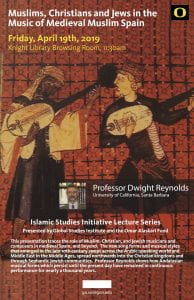Projects
Islamic Studies Initiative Lecture Series
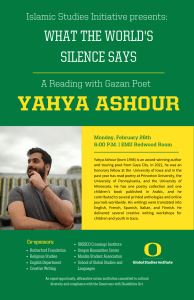 What the World’s Silence Says: A Reading with Gazan Poet Yahya Ashour
What the World’s Silence Says: A Reading with Gazan Poet Yahya Ashour
February 26, 2024
EMU Redwood Room @ 6pm
Yahya Ashour (born 1998) is an award-winning author and touring poet from Gaza City. In 2022, he was an honorary fellow at the University of Iowa and in the past year has read poetry at Princeton University, the University of Pennsylvania, and the University of Minnesota. He has one poetry collection and one children’s book published in Arabic, and he contributed to several printed anthologies and online journals worldwide. His writings were translated into English, French, Spanish, Italian, and Finnish. He delivered several creative writing workshops for children and youth in Gaza.
Abusive or threatening speech toward individual or groups, or, calls for the destruction of people or groups of people will disqualify the audience member from participation in the event.
For all events, the event moderator reserves the right to ask an audience member to yield the microphone if that audience member has either breached, is not conforming to community standards as outlined University of Oregon policy, or is dominating discourse and is not giving time to other audience members to speak.
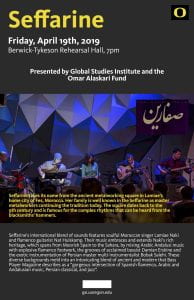
Seffarine. A performance of Andlusian/ Middle Eastern Music
April 19, 2019
Seffarine’s international blend of sounds features soulful Moroccan singer Lamiae Naki and flamenco guitarist Nat Hulskamp. Their music embraces and extends Naki’s rich heritage, which spans from Moorish Spain to the Sahara, by mixing Arabic Andalusi music with explosive flamenco footwork, the grooves of acclaimed bassist Da
mian Erskine and the exotic instrumentation of Persian master multi-instrumentalist Bobak Salehi. These diverse backgrounds meldinto an intoxicating blend of ancient and modern that Bass Player Magazine describes as a “gorgeous intersection of Spanish flamenco, Arabic and Andalusian music, Persian classical, and jazz” Tickets: https://tickets.uoregon.edu/seffarine (free except for service charge for online ticket order) You will be able to get free Seffarine tickets at the door, courtesy of a generous gift from UO alumnus Omar al-Askary.
Muslims, Christians and Jews in the Music of Medieval Muslim Spain
Professor Dwight Reynolds
University of California, Santa Barbara
April 19, 2019
This presentation traces the role of Muslim, Christian, and Jewish musicians and composers in medieval Spain, and beyond. The new song forms and musical styles that emerged in the late 10th century swept across the Arabic-speaking world andMiddle East in the Middle Ages, spread northwards into the Christian kingdoms and through Sephardic Jewish communities. Professor Reynolds shows how Andalusian musical forms which persist until the present day have remained in continuous performance for nearly a thousand years.
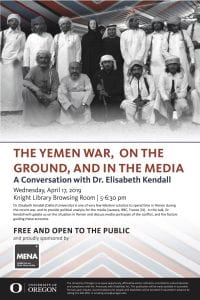 The Yemen War, On the Ground, and In the Media: A Conversation with Dr. Elisabeth Kendall
The Yemen War, On the Ground, and In the Media: A Conversation with Dr. Elisabeth Kendall
Dr. Elisabeth Kendall
Oxford University
April 17, 2017
Dr. Elisabeth Kendall (Oxford University) is one of very few Western scholars to spend time in Yemen during the recent war, and to provide political analysis for the media (Jazeera, BBC, France 24). In this talk, Dr. Kendall will update us on the situation in Yemen and discuss media portrayals of the conflict, and the factors guiding these accounts.
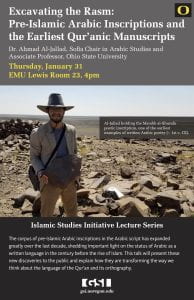 The History of Arabic Language From Before Islam to the Present
The History of Arabic Language From Before Islam to the Present
Professor Ahmed al-Jallad
Sofia Chair of Arabic Studies, Ohio State University, Columbus, Ohio.
January 31, 2018
The corpus of pre-Islamic Arabic inscriptions in the Arabic script has expanded greatly over the last decade, shedding important light on the status of Arabic as a written language in the century before the rise of Islam. This talk will present these new discoveries to the public and explain how they are transforming the way we think about the language of the Qur’an and its orthography.
On Independent Film-Making in the Arab World
Ms. Maysoon Khaled
Filmmaker, CFI Media, Amman, Jordan.
Whither Seasons in our Fast Food Lives: Reflections on Islamic ritual memory and the season’s first fruits in Turkey
Dr. Meltem Turkoz
Bosporus University, Istanbul Turkey
May 24, 2018 Thursday, May 24, McKenzie Hall, Room 125, 4 p.m.
This presentation, led by Professor Meltem Turkoz, Isik University in Istanbul, will examine entries from blogs and hypertext dictionaries and unpack memories and discussions about this ritual to examine the role of food practices as a vehicle for nostalgia, and on the historical meanings of laughter as a generative act. The Internet is a primary vehicle for narrative accounts of early fruit practices as experienced personally or in families. Postings of these accounts are scattered across a range of sites, mostly as direct childhood memories, or descriptions by a generation once removed. These are found among food bloggers and as entries in the collaborative hypertext dictionaries like ekşisözluk , or other similar platforms.
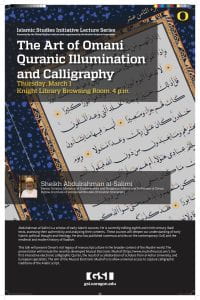 The Art of Omani Quranic Illumination and Calligraphy
The Art of Omani Quranic Illumination and Calligraphy
Sheikh Abd al-Rahman Alsalimi
Ministry of Awqaf; The Sultanate of Oman
March 1, 2018 Knight Library Browsing Room, 4 p.m.
This talk will present Oman’s rich legacy of manuscript culture in the broader context of the Muslim world. The presentation will include the recently developed Muscat Electronic Mushaf (https://www.mushafmuscat.om), the first interactive electronic calligraphic Qur’an, the result of a collaboration of scholars from al-Azhar University, and European specialists. The aim of the Muscat Electronic Mushaf is to allow universal access to capture calligraphic traditions of the Arabic script.
Symposium: Islam, Feminism, and the Women’s Mosque Movement
October 27, 2017
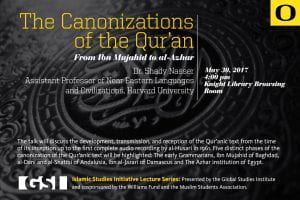 The Canonizations of the Qur’an- From Ibn Mujahid to al-Azhar
The Canonizations of the Qur’an- From Ibn Mujahid to al-Azhar
Dr. Shady Nasser
Assistant Professor of Near Eastern Languages and Civilizations, Harvard University
May 30, 2017
Nasser discussed the development, transmission, and reception of the Qur’anic text from the time of its inception up to the first complete audio recording by al-Husari in 1961. Five distinct phases of the canonization of the Qur’anic text will be highlighted: The early Grammarians, Ibn Mujahid of Baghdad, al-Dani and al-Shatibi of Andalusia, Ibn al-Jazari of Damascus and The Azhar institution of Egypt.
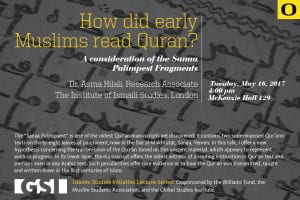 How did early Muslims read Quran? A consideration of the Sanaa Palimpsest Fragments.
How did early Muslims read Quran? A consideration of the Sanaa Palimpsest Fragments.
Dr. Asma Hilali
Assistant Professor, Université du Lille
May 18, 2017
The “Sanaa Palimpsest” is one of the oldest Qur’an manuscripts yet discovered; it contains two superimposed Qur’anic texts on thirty-eight leaves of parchment, now in the Dar al-Makhtutat, Sanaa, Yemen. In this talk, Dr. Hilali offers a new hypotheses concerning the transmission of the Qur’an based on this ancient material, which appears to represent a work in progress. In its lower layer, the manuscript offers the oldest witness of a reading instruction in Qur’an text and perhaps even in any Arabic text. Such peculiarities offer rare evidence as to how the Qur’an was transmitted, taught and written down in the first centuries of Islam.
